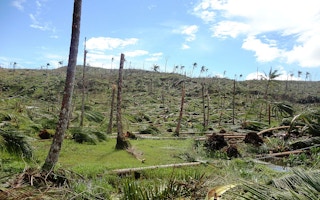As big carbon storehouses, forests have the power to influence the climate. So much so that the protection and expansion of forests is a key part of the Paris Agreement, which seeks to lower greenhouse gas emissions and stave off the worst effects of global warming.
A new study, published last week in Nature Communications, finds forests may have an even bigger cooling effect on climate than we thought. And that without them, the world may be heating up more quickly than expected.
Living vegetation emits gases that can react and combine with other gases in the atmosphere. Some of these, called biogenic volatile organic compounds (BVOCs), affect the formation of other compounds like aerosol, ozone and methane, the presence of which can influence atmospheric temperature.
For their study, an international team of researchers led by the University of Leeds in the UK looked at these reactive compounds to see what kind of a temperature changes they induce. To do this, they simulated boreal, temperate and tropical forest conditions and calculated different warming and cooling effects through computer modeling.
They discovered that while trees emit gases that can warm the atmosphere (e.g., ozone and methane), gases that had a cooling effect had a greater overall impact.
“We found that the cooling impacts of these gases outweigh the warming impacts, meaning that reactive gases given out by forests have an overall cooling effect on our climate,” said study coauthor Dominick Spracklen, a professor at the University of Leeds.
As forests are cleared, emissions of these cooling reactive gases are reduced. The researchers estimate the loss of this function this may contribute 14 percent towards deforestation-caused global warming.
“
We found that the cooling impacts of these gases outweigh the warming impacts, meaning that reactive gases given out by forests have an overall cooling effect on our climate.
Dominick Spracklen, professor, University of Leeds
According to the researchers, this study is the first thorough analysis of the climatic impact of non-CO2 reactive gases emitted by forests and how it’s affected by human-caused land-use change.
“Most previous assessments on the climate impacts of deforestation have focused on the amount of carbon dioxide that would be emitted, or changes to the way the land-surface exchanges energy and water with the atmosphere,” said lead author Catherine Scott of the University of Leeds. “But as well as taking in carbon dioxide and giving out oxygen, trees emit other gases that take part in complicated chemical reactions in the atmosphere and there are implications for reducing these gases.”
The scientists write that effective climate policies will require a “robust understanding” of the relationship between land-use change like deforestation and climate, and urge more research be done toward this goal.
“By understanding these complex effects we now know more about how forests are affecting our climate, and we are able to see a clearer picture of the repercussions of deforestation,” Scott said.
This story was published with permission from Mongabay.com. Read the full story.










